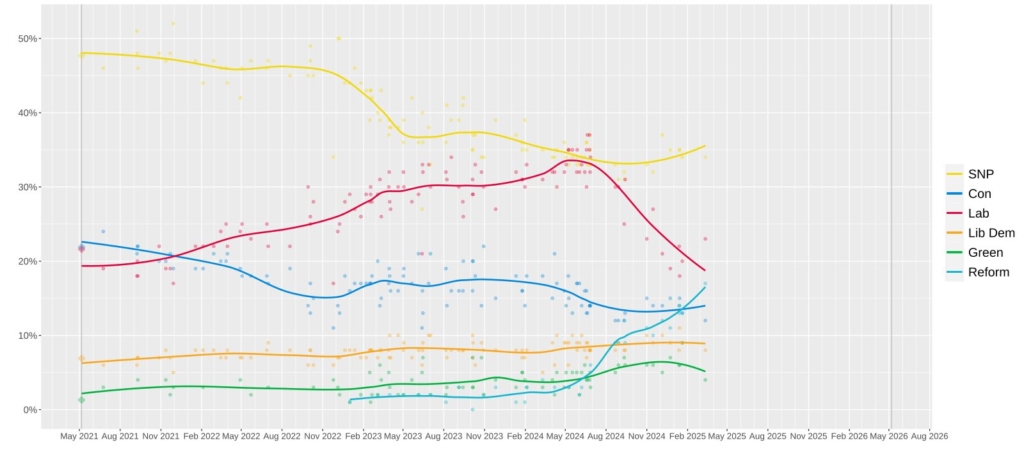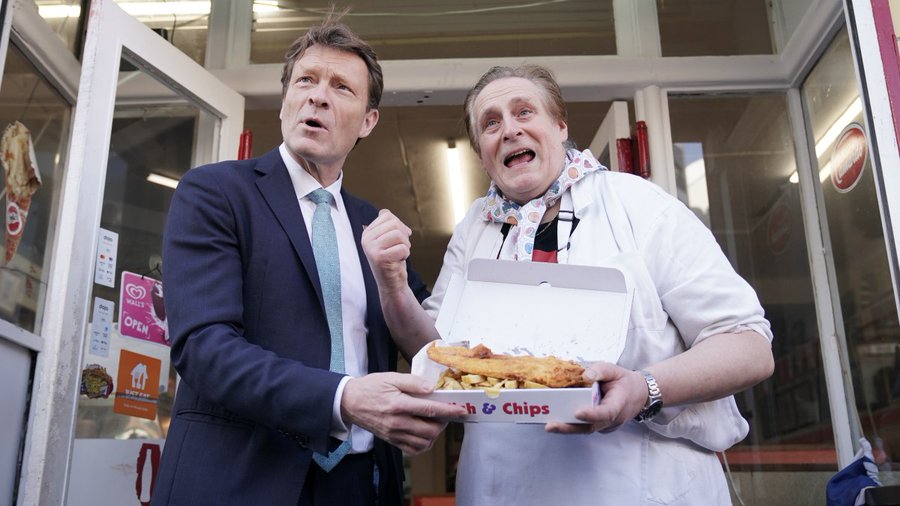Fighting the Far Right, Reform and Scotland
John Swinney’s summit to ‘stop the far right’ had all of the energy of a burst balloon. Having been passed through the civil service it had lost any energy it might have once had. It was, no doubt, full of good intentions, and, as Swinney said: “Today is the start of the process, not the end of the process.”
But it did not have the sense of seriousness it required. Was this about fighting fascism and the far-right in Scottish society as first billed? In which case you’d call together anti-fascist organisations and researchers and community organisers, not Alex Cole-Hamilton. If this was about stopping the rise of Reform, well Swinney and the other parties will need to fight them at the ballot box.
Outside the event a man in a Union Jack t-shirt held a sign saying “Asylum Frauds out” while others held one saying “Mass Deportations Now”. Reform UK’s vetting process is notoriously lax, and the party attracts candidates and supporters from across the far-right. In Scotland this has a particular context, such as Craig Campbell (see On Faragism, Gigafactory’s and Independence). We also saw the recent car crash of Reform in Scotland Reform’s Richard Tice, where Tice was exposed as knowing nothing about his own candidates.
While the media frequently frame Reform’s rise as inexorable and inevitable, it is neither. BBC Scotland’s coverage of the Swinney summit was extraordinarily biased and seemed to suggest that excluding Reform from the event was some kind of terrible cancel culture and repeated verbatim the opposition line that ‘the Nationalists’ (this is the Scottish media talking about Scottish politicians) were responsible for the rise of the far-right.
The narrative about Farage’s party is that they are the ‘party of the people’, speaking up for the disenfranchised and the dispossessed, and that their electoral success is pre-determined. But a quick look at the forces driving Reform, and the dark money behind them, suggests this is a nonsense. As Peter Geogehan has written in Prospect magazine (‘Who Funds Reform?‘):
“Two-thirds of Reform’s donations in 2024 came from millionaires and multimillionaires, according to the New York Times. More than half of its donations were from people with homes in low-tax jurisdictions or with offshore business interests; 40 per cent came from those who have questioned climate change or have investments in fossil fuels.”
These are not the ‘left behind’ or White Van man, these are the Tory party funders shifting their cash to Reform UK and buying influence. Geogehan writes:
“As Reform’s supporter numbers have increased, so has the party’s bank balance. In 2023, Reform raised £155,000 in donations. Last year, the party took in £4.75m. A third of that total came from people who have previously given to the Conservatives”.
These are people like Richard Smith, who owns the infamous townhouse on Tufton Street that houses a group of secretly-funded right-wing think-tanks. Others include Christopher Harborne. the cryptocurrency investor who gave an unprecedented £10m to the Brexit Party in the lead-up to the 2019 general election; Fitriani Hay, the biggest donor to Liz Truss’s 2022 Tory leadership campaign; hedge fund manager Crispin Odey, who in March was banned from working in the UK financial services industry and fined £1.8m by the Financial Conduct Authority; and Nick Candy, a former member of the exclusive “Leader’s Group” of top Conservative funders, wh aims to raise £20million for Reform.
Aside from the disconnect between Reform’s public persona ‘standing up for the little guy’ – and their super-rich backers, there is the question of what their political intent is, other than as a political vehicle for their leader.
Farage’s various parties – UKIP, the Brexit Party, and Reform UK share the same backers and intent. But Brexit is done. Defending or explaining it isn’t something they want to do. Farage and Co’s only remaining message is to cry at some ‘great betrayal’ and mimic Trump’s fringe politics. The problem for Reform in Scotland is that immigration is not the concern it is south of the border, and having hitched themselves to the Trump circus while it was in ascendancy, they remain hitched to it as it descends into chaos and failure.
Second to this, there is a real problem that journalists assume complete continuity – a read across the whole of Britain. On Sunday there was the results of a Shock Poll Shows Reform UK On Course To Win Next General Election declaring “Labour would lose 246 seats and suffer historic losses in traditional heartlands.”


But the polling, which the media regurgitates as part of Reform’s inexorable rise, are no such thing. The polling shows them winning zero seats in Scotland, and, in fact, we know that a triumphant Farage would mean a resurgent Yes vote:


Labour’s Reform Messaging
This polling provided difficulties for Anas Sarwar who preceded the ‘stop the far right’ summit accusing the SNP of fuelling the rise of Reform UK. If that were the case then why is Labour’s decline in the polls a near mirror image of Reform’s rise?


It is true that the rise of support for what we’re still calling euphemistically ‘populism’ has to do with the failure of the centrist parties to respond to and address catastrophic social breakdown: rising inequality, poverty, and the housing crisis. But the problem for Scottish Labour is that their UK colleagues have been explicit in their efforts to ape and mimic Reform in a desperate attempt to stave off their electoral assault. There is no sign this is winning or winnable, and is widely seen as a disastrous strategy. It does make it ridiculous for SLAB to accuse the SNP of being the cause of Reform’s rise.
Very often the Scottish media simply regurgitates a sample line about Reform’s rise and assumes it will be uniform across the UK. The Times managed at least to point out that:
“Reform UK has claimed that its membership figure north of the border will eclipse Scottish Labour’s by the end of the month despite the party having no discernible Scottish policies”


Reform UK is an English nationalist party that is endlessly replaying the messages of Brexit: that all of your troubles are down to ‘bloody foreigners’. This will have some success in Scotland in 2026, but it will be extremely limited. The level of success any progressive forces in Scotland will have in fighting the far-right, of which Reform is a key part, will be in how much they are able to respond to the social crisis and offer genuine, credible solutions to the problems people face.

The first way you fight Reform UK in Scotland is pointing out that Farage was one of the original leaders of Brexit and point out how bad that has been for the Scottish economy and people.
Secondly point out that Farage was a great supporter of Thatcher and her policies (especially privatisation which is why so many Scottish assets are owned by people living overseas).
Thirdly – point out Reform want to privatise the NHS.
Fourthly – point out Reform wish to cut taxes for their rich backers and this will mean less money for public services in Scotland.
Of course all these questions should be pursued by journalists but this doesn’t happen in UK due to those who control the media.
Lastly hammer home the fact that Farage is basically a right wing English nationalist who thinks that England and UK are synonymous.
I may be cynical but I think John Swinney’s initiative was more about embarrassing the Tories in Scotland. It also raises profile of Reform Uk in Scotland with threat of Reform UK government at Westminster being a potential driver for support for independence. I hope it succeeds in its stated aim but I fear it may allow Reform UK to pose as antiestablishment party. This could be avoided if the lead is taken by civic society representatives rather than elected politicians from now on.
I couldn’t help thinking watching the great and good from civic society and like minded politicians turn up to talk on a cross party basis that this reminded me of the Constitutional Convention set up post 1979. I then wondered whether this is the type of initiative the Independence movement would benefit from at present?
The orchestrated attack on Reform is laughable. However, it is consistent with the globalist establishment. You take George Soros’ funding of dubious foundations who go on to interfere with UK democracy.
This obsession with demonising any non-progressive political movement have become so prevalent amongst the globalist states of the West, that it doesn’t occur to them that perhaps this drive to minimise the choice of the majority population is a serious threat to our democracy. Across the UK and Europe we now have minimal suffrage rather than true democracy.
Reform, as indeed the populist parties are deemed unfit for today’s progressive narrative. However, the clue is in the word “Populist” – which relates to the will of the populations.
It’s amazing how the progressives see no contradiction in trying to undermine the will of the people.
Regardless of the Swinney initiative, you are not going to ban Reform UK. If you keep ignoring the people, then things far worse to your sensibilities will happen then you experienced with Brexit. Reform is the UK’s last chance to avoid a slide in to civil unrest and sectarian war.
Be careful what you wish for.
Farage was in.part responsible for the disaster of Brexit. Reform is led by millionaires and ex Thatcherites like Farage. They are in favour of privatising the NHS. In my opinion anyone who.promotes them is anti working class and therefore against the majority of the population.
Be careful what you wish for ? Such as a secular Scottish republic. What’s not to like ?!
Stevie H
Reform UK is a privately owned limited company.
Please tell me who funds them and where the funds come from?
NF was great supporter of Maggie Thatcher and privatisation. Due to privatisation (selling off the family silver) tell me who owns the natural resources in UK and where do they come from?
Where does Richard Tice live when not at Westminster?
I could go on but answer these basic questions and tell me NF (privately educated, former Citt of London trader) is a man of the people acting in the best interests of the people of UK.
Unbelievable that an article on this subject leads ( again) with criticism of the SNP ( who took the pro-active step to take a stand and organise the forum)…go figure……
https://youtu.be/pl9kcJ6RRmU?si=6MeR_uv9tEm5frRO
John Swinney may be right to be concerned about the rise of what he terms the ‘Far Right’ in Scotland (and elsewhere) but avoids the reasons why this is happening.
History informs us that when political leaders are seen to be high-handed, corrupt, fraudulent, careerist charlatans and chancers – such as they are in all the representative parliamentary parties – people in their desperation turn to pied pipers like Nigel Farage as the solution to society’s ills.
John Swinney might be calling for political parties and civic organisations to unite against the ‘Far Right’ but he will not be addressing the causes of dissatisfaction of course. He wouldn’t need to call for a united approach against the ‘Far Right’ if that were the case, he would just have to appoint some principled ministers and put decent policies in place.
The SNP leader wishes to present this as some kind of principled stand. It is not.
John Swinney’s enterprise is really just a cynical diversion, distraction and deflection at a time when he should urgently be pursuing the restoration of Scotland’s full self-government and return of Scotland’s independent statehood.
Be Honest, John.
Do what it says in article 2a of the your party’s constitution. Do what you said you would do. Do what you were elected to do.
That is the way to permanently resolve what is essentially an imported British problem.
I don’t believe that it is sensible to put energy into countering Reform. Rather than giving them the oxygen of publicity we should be out there talking to the undecided or wavering. We need to counter the negative publicity that is pushed out by media and our political opponents and get the message across that we, in Scotland have both the means and the ability to thrive as an independent country.
Indeed, but that needs vision, energy, ambition, creativity, boldness and empowering messaging. We don’t seem to be getting any of that from the SNP or the Scottish Government. John Swinney seems much more concerned with looking First-Ministerial and the observance of his Corstorphine Protocols.
Graeme / I think the SNP have taken an enormous hit to their popularity and confidence over last two years. This was brought home to them at last years General Election. They are currently focused entirely on trying not to lose power at Holyrood next year. They are trying to stabilise from all the drama of leadership elections and their policy is don’t frighten the horses and let Labour implode.
I don’t think that’s a good enough excuse.
I am not saying I approve or think it is an excuse I am only making an observation.
@Dougie Blackwood,
“We obsess over the angry young men going Reform. But what of the anxious young women going Green?” Gaby Hinsliff
https://www.theguardian.com/commentisfree/2025/apr/25/young-men-reform-women-green-voters
Usual caveats apply, but the bias in coverage seems undeniable.
In terms of commitment to distintively Scottish policies, it seems to me that there is little to choose between Labour and Reform.
Robin McAlpine has written about the recent meeting; ‘It was a summit of the people who run Scotland.’ It gathered ‘a bunch of wealthy people to complain that the plebs aren’t behaving properly’.
If you agree with this analysis, and I do, then it should be opposed. It is using the growth in support for Reform to distract from its own major part in the general malaise afflicting Scotland today.
Where does the Scottish left fit into this ? According to the Edinburgh Reporter, ‘The King’s Foundation’ will be there, as will ‘Columba 1400’ and ‘Marie Curie.’ Even ‘Men’s Sheds Scotland’ have said they will attend. (Like most people, I would have been sorely disappointed had they not participated.) Perhaps the Scottish left is paying the price for having little or no electoral footprint.
I most definitely do not agree with this analysis. The participation of the STUC, and what Roz Foyer had to say about the summit, rather contradict McAlpine’s typically sour comment.
I would argue the best approach is to look at what didn’t work in bringing down support for Trump in the US, a negative campaign of (justifiable) political and personal attacks. These have their place (pointing out that Farage is a privately-educated former financier who idolises Thatcher). But what populists do is take advantage of a lack of representation in a democracy, and the only way to win over their supporters is to argue, positively, that you really represent their interests. This could be talking about lost senses of community and identity, lack of jobs that one can take pride in, regional inequalities. More negativity just fuels despair, which could cause something even uglier that Farage to emerge.